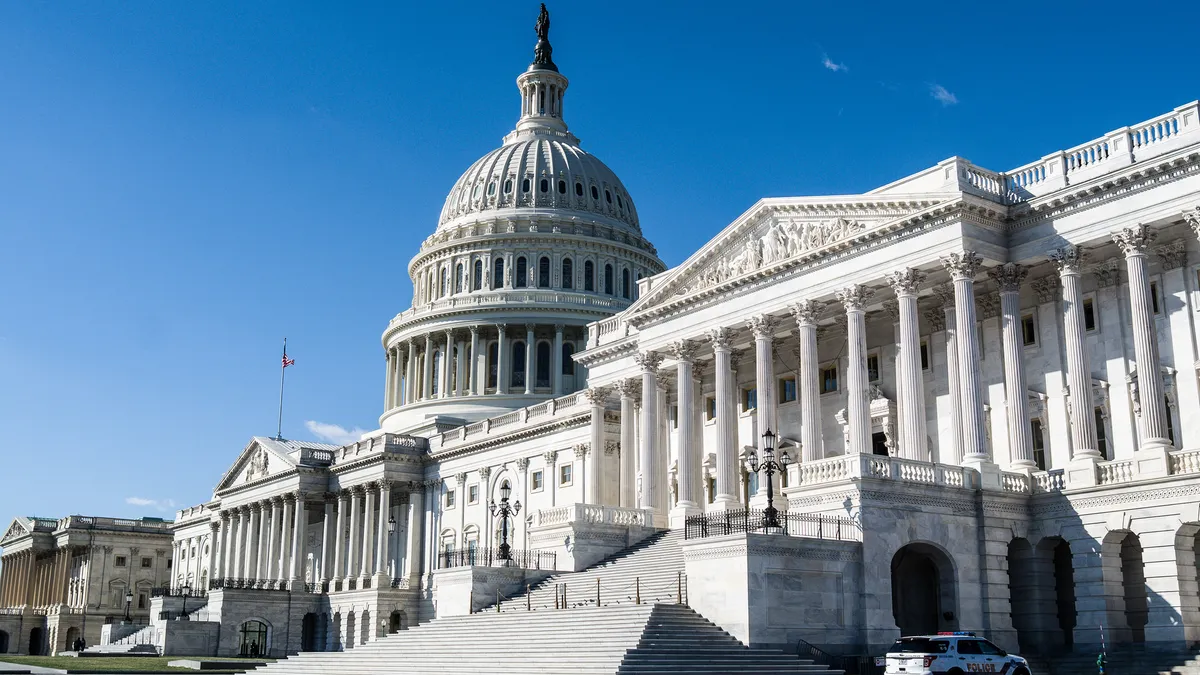UPDATE: JULY 30, 2020: The U.S. Senate confirmed July 29 the nominations of Marvin Kaplan and Lauren McFerran to additional terms on the National Labor Relations Board.
Dive Brief:
- The U.S. Senate Committee on Health, Education, Labor & Pensions voted to advance three new nominees to the U.S. Equal Employment Opportunity Commission (EEOC) during a June 3 executive session.
- The EEOC nominees include Keith Sonderling, the current deputy administrator of the U.S. Department of Labor's Wage and Hour Division; Andrea Lucas, associate at law firm Gibson, Dunn & Crutcher LLP; and Jocelyn Samuels, executive director at the University of California, Los Angeles (UCLA) School of Law institute. Lucas will replace outgoing commissioner Victoria Lipnic, the agency's former acting chair, whose current term expires July 1, 2020.
- The committee also voted to advance the nominations of two current National Labor Relations Board (NLRB) members, Marvin Kaplan and Lauren McFerran, to additional terms. Sen. Lamar Alexander, the committee's chair, said in an opening statement that Sen. Chuck Schumer, D-N.Y., is in talks with the White House about an additional potential nominee to NLRB.
Dive Insight:
Pending a future Senate vote, the EEOC could return to a full, five-member commission from its current count of three commissioners. The news follows the confirmed reappointment of Commissioner Charlotte Burrows, currently the lone Democratic representative on the commission, to a new term ending in 2023.
The EEOC has seen a major shuffling of staff in the past year, most notably with the appointment of chair Janet Dhillon in May 2019. Dhillon's confirmation restored the agency's quorum even as two other Trump administration nominees, Daniel Gade and Chai Feldblum, withdrew from the process. The Senate also confirmed in August the nomination of Sharon Fast Gustafson to become the EEOC's General Counsel.
Those changes have occurred during what will likely be a challenging moment for the agency amid the COVID-19 pandemic. EEOC has already delayed the opening of employer data collections, including reporting for the 2019 EEO-1, to allow filers time to address issues unique to the pandemic. It will instead collect both 2019 and 2020 EEO-1 Component 1 forms from employers in March 2021, pending approval from the White House Office of Management and Budget. Similarly, EEOC has provided guidance to employers on COVID-19 specific workplace issues like workplace testing.
"Workers across our country are facing unprecedented struggles in light of the coronavirus crisis, and these worker protection agencies are more important than ever before," Sen. Patty Murray, D-Wash., said at the hearing. "So we need to consider carefully whether each nominee is truly fighting for workers' rights and protections."
But even beyond the pandemic, the agency is still working through its plan of action on employer pay data collection, an initiative it put on hold after completing the first such collection cycle via EEO-1 Component 2 in September 2019. EEOC said in November that it may adopt future processes for pay data collection via rulemaking in September 2020. But members of the commission, including Burrows, have spoken about the barriers to resuming such data collection in recent months, despite reaffirming it as a "priority" for EEOC.
The agency is also actively involved in an appellate case before the U.S. Supreme Court over gender identity and sexual orientation protections under Title VII of the Civil Rights Act, in which it is opposing the U.S. Department of Justice. The court is expected to issue a decision in the case in the coming months. Samuels, in her UCLA biography, cited prior policy work aimed at applying federal law to remedy discrimination on the basis of sexual orientation and gender identity.
The nominations to NLRB, if confirmed, would still leave one Democratic vacancy on the board. The board has continued its work during the pandemic, most recently having dealt with a federal district court judge's decision to partially block changes to NLRB's union election rules. The board said June 1 that it would appeal the ruling while implementing in full all changes unaffected by the court's order.














